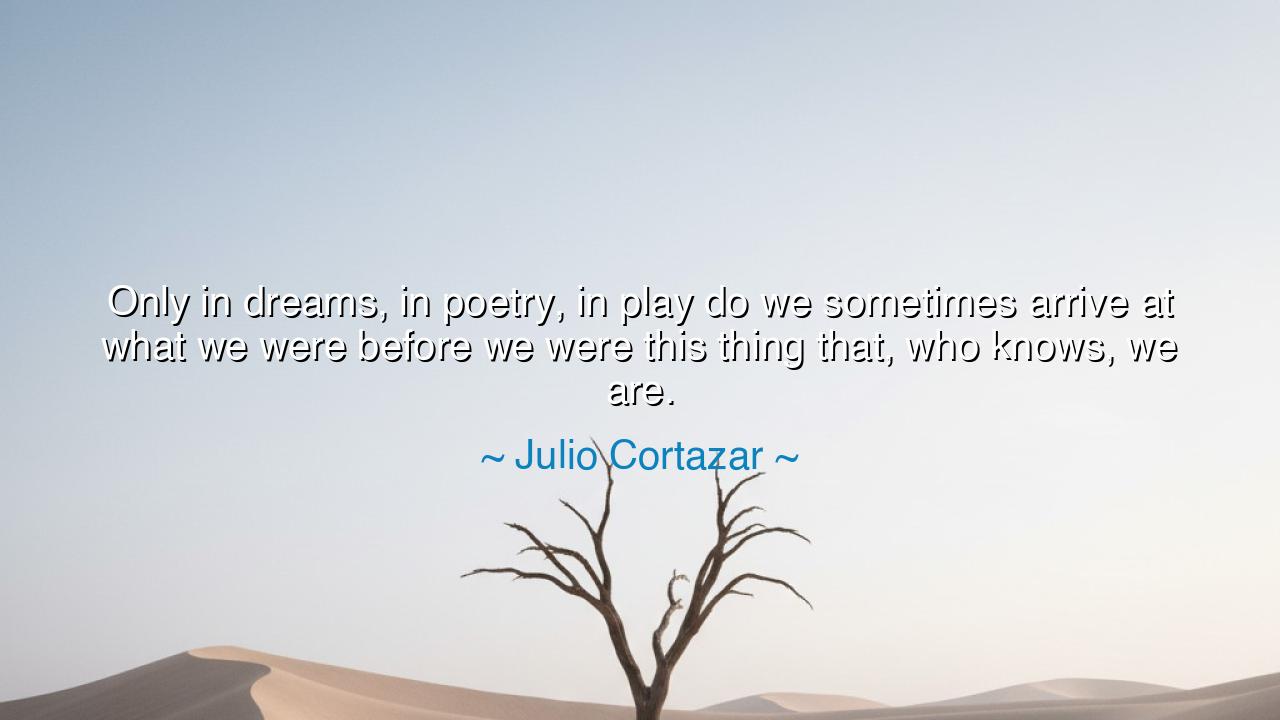
Only in dreams, in poetry, in play do we sometimes arrive at what
Only in dreams, in poetry, in play do we sometimes arrive at what we were before we were this thing that, who knows, we are.






When Julio Cortázar, the magician of words and dreamlike worlds, wrote, “Only in dreams, in poetry, in play do we sometimes arrive at what we were before we were this thing that, who knows, we are,” he was not merely speaking as a writer—he was speaking as one who had glimpsed the soul before it was clothed in the garments of the modern self. In this line, he reminds us that there was once something pure, untamed, and infinite in us, something lost amid the noise of reason and routine. It is only through dreams, poetry, and play—those rare sanctuaries of freedom—that we return to that primordial self, the one untouched by fear, conformity, or time.
Cortázar, born in Argentina and nourished by the surrealism of both Latin America and Europe, lived between two worlds—the rational and the magical. His works, such as Hopscotch and Blow-Up, sought not to explain life but to rediscover it, to pierce through the thin veil of normality and find what lies beneath. His words in this quote carry the scent of that lifelong pursuit: the yearning to remember who we were before we became what society demanded us to be. For in the rush of becoming adults, citizens, professionals, and thinkers, we forget that we were once children of wonder—creatures of imagination and laughter, capable of joy without reason and awe without understanding.
“Only in dreams, in poetry, in play…” These are not mere escapes; they are portals. In dreams, the soul roams where the mind cannot—shapeless, fearless, unbound. In poetry, language ceases to be a cage and becomes a bird, carrying our essence into flight. And in play, we rediscover the holy art of being fully present—of delighting in existence without asking why. Through these, we return to the timeless within us, the divine spark that existed before we were defined by names, duties, and expectations. Cortázar knew that in such moments, we glimpse what we were before we became this strange, fragmented creature we call “ourselves.”
Consider the life of William Blake, the English poet and painter who lived in poverty but possessed a kingdom of vision. He spoke with angels, painted dreams, and wrote words that burned with cosmic fire. To the world, he seemed mad; to himself, he was awake. Blake believed that imagination was not an escape from reality but the highest form of truth, the remembrance of the divine origin of man. In his art and poetry, he lived as Cortázar described—half in this world, half in the one before it. Through his dreams and poetry, he remembered what we have forgotten: that we are more than flesh and reason; we are spirit and song.
Cortázar’s words also carry a tone of melancholy. When he says “who knows, we are,” he reveals a sorrowful truth: that modern humanity has lost its certainty of being. We are clever, informed, connected—yet we no longer know what we are. Our identities are built on mirrors—on roles, achievements, and screens—but not on essence. Dreams, poetry, and play become acts of rebellion, sacred rituals through which we reclaim the forgotten language of the soul. They remind us that to be alive is not merely to survive or achieve, but to wonder, to feel, and to create.
Thus, the lesson is clear and profound: seek the sacred spaces where you are unmade and remade. Do not abandon dreams to the night, nor poetry to the classroom, nor play to childhood. Keep them as living fires within you. When the world grows heavy with expectation and structure, return to these things—not to escape reality, but to remember your reality before the world shaped it. Write, sing, dance, imagine—whatever calls to that inner child who still sleeps within the fortress of your adult self.
For in the end, Cortázar’s message is both nostalgic and revolutionary. It calls us to reclaim our original humanity—that radiant state of wonder and freedom that existed before names, fears, and masks. To dream is to heal. To play is to remember. To write or to create is to touch eternity. Let us, then, practice these arts not as distractions, but as paths homeward—to the place where we were once whole, and may yet be again.






AAdministratorAdministrator
Welcome, honored guests. Please leave a comment, we will respond soon